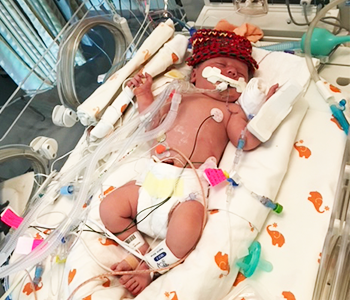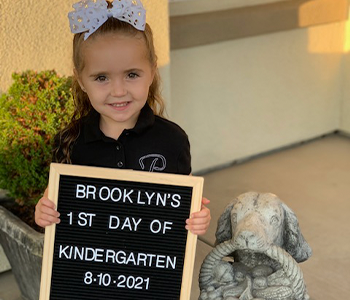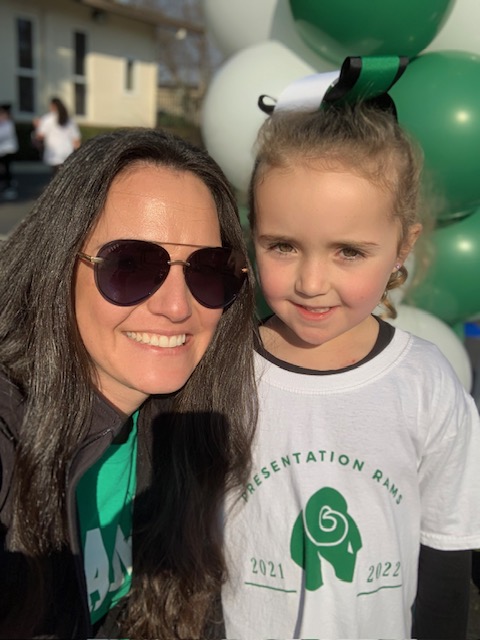Brooklyn: A Healthy Heart and Mind

When we first met Brooklyn Bertilacchi in 2020, she was a feisty 3-year-old who loved to sing, dance, and dote on her younger brother. Back then, Brooklyn was still so little that she had no idea she’d been through a major medical challenge.

By the time she was 1, Brooklyn had already undergone four surgeries at UCSF Benioff Children’s Hospitals to correct a severe congenital heart defect that was diagnosed at birth.
In the years that followed, Brooklyn’s parents, Katie and Tito, never let their guard down. They knew that Brooklyn would need another procedure in the years ahead. And during the COVID-19 pandemic and the RSV outbreak, they took every precaution: either illness would have landed Brooklyn in critical condition.
But what came next was a total surprise. When Brooklyn started preschool, Katie noticed that something was off. Brooklyn was struggling to focus and follow directions. During homework, she would write normally, then backwards, then forget how to form the letters. As the other kids learned to read, Brooklyn grew more frustrated. Things only got worse in kindergarten.
Katie started to research. There were articles online linking congenital heart disease with ADHD and autism. She reached out to Brooklyn’s cardiologist, Lisa Arcilla, MD, who confirmed it: Many children with complex congenital heart disease are at increased risk for neurodevelopmental differences as they grow up.
“I felt helpless,” Katie says. “I just thought, when will this kid catch a break? But it was also like a sigh of relief. We knew that there were resources out there for us, that there were people out there to help us. It made it easier knowing that we weren’t alone.”
A Dual Challenge
Congenital heart disease – an abnormality of the heart that develops before birth – affects nearly 1 percent of newborn babies every year. These days, thanks to medical and surgical advances, the vast majority of children with these conditions are surviving childhood and growing into adulthood.
As the number of survivors has increased, so has our understanding of the challenges these kids face later in life. More than half of children with congenital heart disease experience neurodevelopmental difficulties that affect their behavioral and cognitive development.
But why?
"Part of the brain’s job when it’s young is to continue to grow.” says Shabnam Peyvandi, MD MAS, pediatric cardiologist. “When the heart can’t do its job, the brain doesn’t get the nutrients it needs. So, for children with congenital heart disease, their brains end up developing differently from other kids.”
In 2017, months after Brooklyn was born and rushed into heart surgery, UCSF took these findings and established the groundbreaking Healthy Hearts and Minds (H2M) Program – which Dr. Peyvandi co-directs with pediatric neuropsychologist, Stephany Cox, PhD, to identify and address neurodevelopmental concerns in children with congenital heart disease as early as possible.
When Dr. Arcilla heard about what the Bertilacchis were going through, she made the referral immediately. After an 8-hour assessment with Brooklyn, parent interview, and family feedback session, Dr. Cox diagnosed Brooklyn with ADHD.
The Path to Healing
Dr. Cox’s assessments are comprehensive. She looks at everything: cognitive abilities, attention, language, memory, fine motor skills, social and emotional development, and executive functioning. After a feedback discussion with the family, results are summarized in a detailed report with recommendations for treatment, education, therapy, and parental support.

Katie says she uses the report like a guidebook – to get Brooklyn the accommodations that she needs at school and help her regulate her emotions at home.
One of the recommendations was behavioral therapy, where the Bertilacchis learned coping mechanisms that are helping Brooklyn calm her brain, mitigate feelings of confusion, and build her self-esteem.
“It has been vital to our overall healing process,” Katie says.
“H2M has made her life easier, our life easier, and it’s helped us enjoy each other more. You can fix a heart with heart surgery, but you need to fix the whole person, the whole body, the whole mind, the whole spirit.”
Closing the Gap
Since H2M launched in late 2017, Dr. Cox has completed nearly 200 assessments of children with congenital heart disease. Approximately two thirds of these patients exhibit neurodevelopmental difficulties and Dr. Cox continues to follow all children enrolled in H2M until they reach adulthood.
The challenge is that the wait for H2M services is long – typically over six months – and studies show that early intervention is critical to a child’s long-term success. But the program, which was launched with philanthropic support, relies on private funding to expand.
“With more clinicians, we would be able to see a higher volume of patients and shorten the time they spend on our waitlist,” says Dr. Cox. “We need more psychologists, a social worker, and a school liaison to help these families navigate the education system.”
The Bertilacchis have taken steps to close the gap. In addition to participating in Hospital fundraising events, they hold an annual campaign – Go Red for Brooklyn – to raise money for the cardiology department. Katie says she wants Brooklyn to learn to use her own experience to help others.
"Pretty much everything that has ever saved her life or made her life better has come out of philanthropy. It is so important to fund these programs, back these doctors, support these staff, and propel their cutting-edge work. It’s programs like these that give kids like mine a real chance at life.”

The UCSF Pediatric Heart Center emphasizes a holistic approach in the care of children with heart conditions, to ensure our patients are growing to their greatest potential to be healthy and thrive in every way.